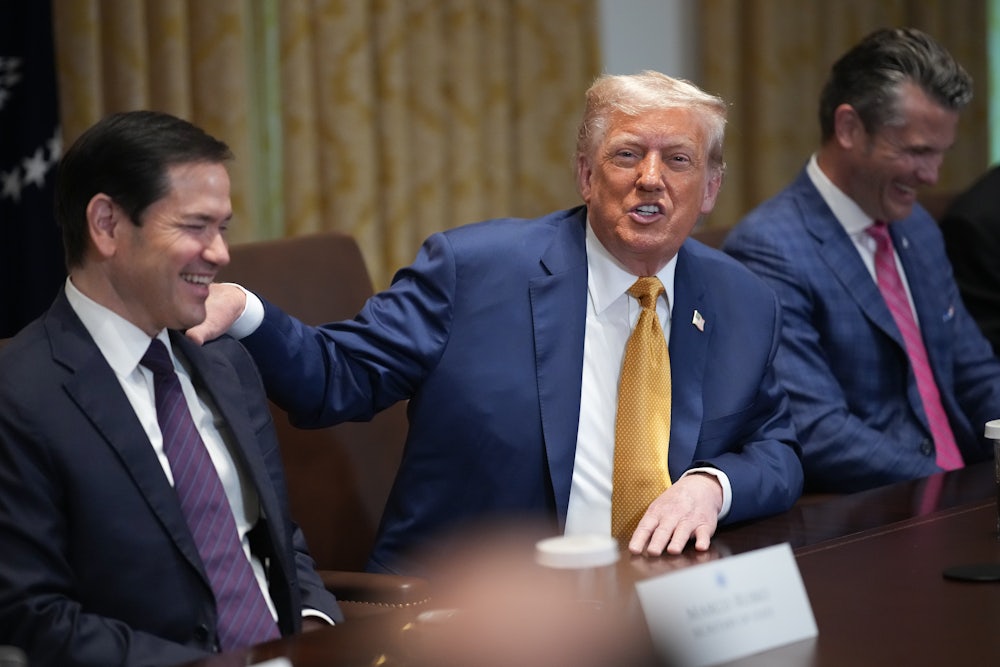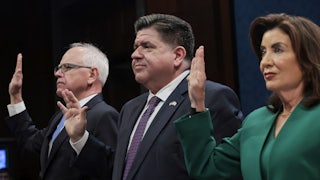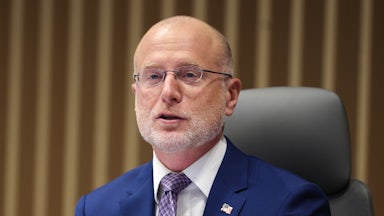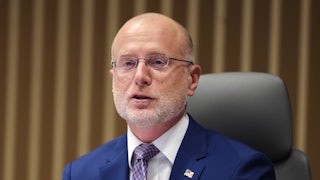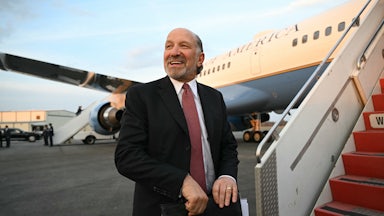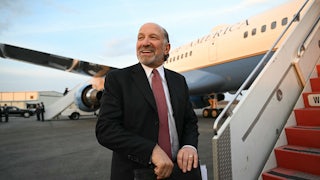I do not wish to leave out an important branch of this subject, for it is a danger from which princes are with difficulty preserved, unless they are very careful and discriminating. It is that of flatterers, of whom courts are full, because men are so self-complacent in their own affairs, and in a way so deceived in them, that they are preserved with difficulty from this pest.
—Nicolo Machiavelli, The Prince, 1532
A Trumpworld figure isn’t judged
On how he carries out some duty.
It’s more about the kisses he
Can plant on Donald Trump’s patootie.—Calvin Trillin, The Nation, May 2025
Like the “gilded rococo hellscape” of President Donald Trump’s redesigned Oval Office, the rhetoric that Cabinet officials and foreign leaders deploy to flatter Trump, now in his second term, has ascended to a level of self-parody so exalted that we must ask whether the escalation can long continue. If these blandishments scale greater heights, will Trump finally detect the winking contempt they communicate to the rest of humanity? Can flattery become too crude, or too extreme, to gratify its recipient? On this last question we’re all witnessing, in real time, a natural experiment at 1600 Pennsylvania Avenue.
A July 8 Cabinet photo op was, like its predecessors, a North Korea–style exercise in competitive groveling:
“I want to thank you for your leadership,” Homeland Security Secretary Kristi Noem told Trump. “Several times, the day after the Texas flooding, you and Melania were on the phone with me, and I want to thank you for that.” (Reality check: Spurious new cost controls enacted by the administration delayed FEMA deployment by 72 hours.)
Defense Secretary Pete Hegseth said that at the recent NATO meeting, he witnessed “how the world responds to us saying it’s time for you to shoulder the burden and take the lead for your continent. It only happens with President Trump leading.” (Reality check: NATO, which recently pledged to increase defense spending to 3.5 percent of gross domestic product over 10 years, has yet to meet its previous 10-year goal of 2 percent.)*
Interior Secretary Doug Burgum: “The fact that you’ve endorsed and supported a policy of energy dominance, that sends a signal to the market that we’re going to have more supply. You talked during the campaign about inflation being a country-buster. You’ve broken the back of inflation in six months, among all the other things you’ve accomplished.” (Reality check: The consumer price index wasn’t notably high when Trump entered office.)
Foreign leaders engage in a similar sycophantic competition. On Monday, Israel’s Bibi Netanyahu told Trump that he’d nominated him for the Nobel Peace Prize. (Reality check: Two and a half weeks earlier, Trump dropped fourteen 30,000-pound bombs on Iran.) Two days later, five visiting African leaders saw Bibi and raised. Two of them said they agreed Trump deserved the Nobel, and a third praised Trump’s golf game. “I know you are a tremendous golf player,” said Senegal’s Bassirou Diomaya Faye. “Golf requires concentration and precision, qualities that also make for a great leader.” (Reality check: Three years ago, Bill Pennington of The New York Times followed Trump at his Bedminster, New Jersey, golf resort and observed him cheating.)
When I was a young man, I thought flattery worked only when it was performed with consummate skill. The world vigilantly kept watch against flatterers, and one risked humiliation if caught. I followed this admonition to a fault. Forty-odd years later I’m still embarrassed that, after receiving a note of praise for something I wrote from a writer I very much admired, I declined to write back to thank him. I told myself that thanking him and expressing my admiration would be kissing ass.
I’m older now and recognize how prideful that was—and how rude. Perhaps I was misled by an education in the humanities, where everywhere flatterers are condemned. The most dangerous flattery, advised Plutarch, “is that which is hidden, not that which is openly avowed.” Beware! The recipient of overly extravagant praise, on perceiving it to be such, will judge the flatterer deceitful.
In A Midsummer Night’s Dream, Helena disbelieves a wildly passionate declaration of love from Lysander, who, bewitched by a magical potion, abruptly pursues her. Helena rightly disbelieves Lysander but, not knowing about the potion, concludes that Lysander is making fun of her. “Wherefore was I to this keen mockery born?” Helena asks. “Good troth, you do me wrong, good sooth, you do, / In such disdainful manner me to woo.”
Maybe people had more self-knowledge in ancient Greece and Elizabethan England. We sure don’t mistrust flatterers today. Can you imagine Trump saying to a bootlicking Noem or Hegseth or Bibi, “Wherefore was I to this keen mockery born?” Me neither. Normal people don’t typically tend to notice flattery, nor do they upbraid the flatterer when they do. (Indeed, one 2002 study said it doesn’t even matter how vain you are.) In our self-centered age we’re more likely to feel underappreciated than we are to feel manipulated by flattery. Self-help literature instructs us how to demand and receive respect and proper gratitude, not how to tell sycophants to cut it out. To the extent the field of psychology today studies flattery, it’s mainly to examine how well it works.
Psychologists speak of “the ingratiator’s dilemma,” which is that the more dependent you are on the person you’re flattering, the more suspect your praise for that person will be. But there are plenty of ways to work around this. One technique is for the flatterer to disagree with his target on little chickenshit things to build credibility for when he agrees on big things. A classic device is to engage in good-natured banter about how my basketball/football/baseball team is better than yours. Another technique is the bank shot: Extend your praise indirectly through a third party. In the Trump administration, that method is routinely achieved via an appearance on Fox News. If you want to kiss Trump’s ass, do it on his favorite channel.
The power imbalance between a president and a Cabinet member or other foreign leader should make it harder to avoid the ingratiator’s dilemma, but my extensive fieldwork suggests that with Trump there simply is no ingratiator’s dilemma. Indeed, we have much evidence that to whatever extent Trump can perceive flatterers to be insincere, Trump enjoys it because it makes him feel more powerful. As the former New Republic editor Michael Kinsley once observed, “Insincere flattery is more flattering than sincere flattery. The less someone means what they say, the greater the compliment.” That’s a point Plutarch and Niccolo Machiavelli never considered. In Trump’s case, he relishes insincere flattery for the deeply unhealthy reason that it’s an occasion to watch a former enemy grovel. Trump’s vice president, you may recall, used to compare him to Hitler. Trump should hate JD Vance for that. Instead, Trump seems to find it a gratifying sign that they’ll all beg his forgiveness sooner or later.
And so the arms race to praise Trump continues. Nobel Peace Prize? How about beatification? Trump could sell Saint Donald meme coins. Or, what the hell, declare Trump to be the Messiah. The first foreign leader to do that will have all existing tariffs removed. The main thing to remember is that flattery is not, as earlier societies maintained, a game of skill. You don’t have to be good at it. You just have to do it to greater excess than everybody else. It’s about quantity, not quality, most especially with Trump.
* This article originally misstated the defense spending-to-GDP ratio.
